The Continuing Struggle of Being an Indie Dev
Independent developers have more tools than ever at their disposal, but the challenges they face are still great.
This article first appeared on USgamer, a partner publication of VG247. Some content, such as this article, has been migrated to VG247 for posterity after USgamer's closure - but it has not been edited or further vetted by the VG247 team.
Game development is hard.
We hear, again and again, that with tools like Unity and the App Store that it's never been easier to make a quick buck cranking out some games. At its peak, Candy Crush was raking in well over a million dollars every day. Flappy Bird, Five Nights at Freddy's—these games dominate news stories and make their creators huge lumps of cash, but they are exceptionally rare rags-to-riches success stories. The real stories of independent developers that want to keep making games is much grimmer.
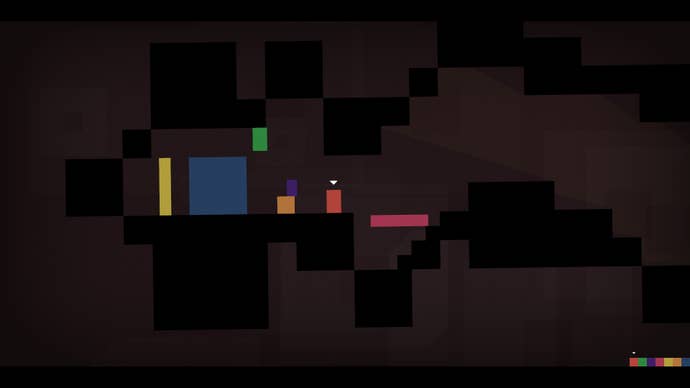
Mike Bithell – Mike Bithell Games
Thomas Was Alone was something of a sleeper hit. Released in 2012, it took quite some time for it to find an audience. It's not hard to see why, either. It doesn't look particularly great, and there's nothing that seems outwardly special about it. To just about anyone it looked like a game about boxes jumping around.
Even creator Mike Bithell didn't expect much it. It was a "hobby game," that he put together in his spare time. He'd already been in game development for some time, but a good chunk of his work was tie-ins for kids shows and movie. "There aren't a lot of 9/10 scores to my name," he quips. It seems unlikely, then, that Thomas Was Alone would have ever sold a million copies—a threshold many full-retail releases with huge marketing budgets don't always cross. But looking back, Bithell thinks it makes sense.
"[It] did well because it was a critical darling. It was slightly highbrow, slightly left leaning and it was about friends and feelings and s**t. That tends to align with what critics typically like. I was fortunate in that my politics, my age, my gender I share in common with the vast majority of game critics... So they often share the same taste, worldview, nostalgia and all these other things. I made the game I wanted to make, but it's not surprising why critics picked it up."
Times are changing though, and as YouTube personalities and Twitch continue to gain popularity, the traditional critics (i.e. people like myself) probably won't be the gatekeepers much longer. Realizing that, Bithell says that for his next game, Volume, he's given some thought to how his game might be picked up by streamers and Let's Players.
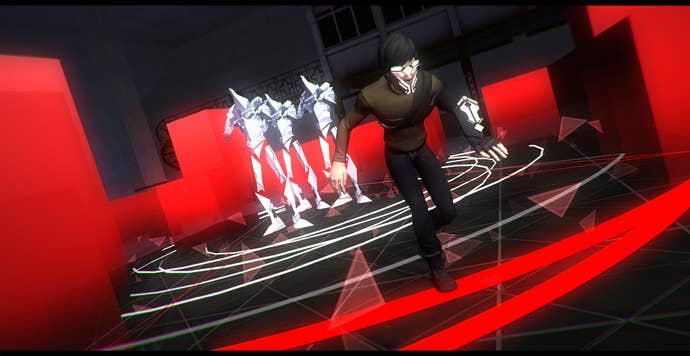
"With Volume we're not making a game that's meant to be funny YouTube fodder," He said. "But we've made a deep level editor that will let people make lots and lots of content and people can make lots of videos about it as they do with roguelikes. I don't obsess over it, but I do give some thought on how it will look in a video. It's not just an artistic pursuit. If you need to be successful, you have to consider the commercial aspect as well. These are concerns that you have to have if you want to be viable."
Mike Bithell's putting about half of what he made from TWA into Volume. Solid numbers are hard to come by, in part because just about every digital marketplace refuses to let developers publish exact numbers, but it's not hard to get a pretty solid guess. I threw out a few numbers for the sake of argument and came to $350,000-500,000 as the budget for Volume, and while Bithell "couldn't confirm or deny" anything, he said I was "in the ballpark." By contrast, Thomas Was Alone hit £7,000 or just over $10,000, and even that's steep for a "hobby game."
Despite the cost, Bithell says he cut corners with Volume. For example, the main character wears a mask. Right there you don't have to worry about facial animations or lip-syncing. The environments are abstract meaning the team can use fewer textures, and have an ex-PS1 artist design most of the levels. He calls this the "Kevin Smith approach."
"All he had to do for Clerks was throw in a single line to explain why the shutter was down, and he could film at night savings about a million on what a proper set would cost. Every choice we've made has been made to make the game we want to, and cut around the expensive stuff. No one in history has had a perfect creative career that has hit after hit after hit. Even if you're the greatest genius in game devs history, you're not going to have a perfect record. In the face of absolutely certain failure at some point, and it just makes sense to make sure that in five years' time or even in ten years' time I'm still doing what I love."
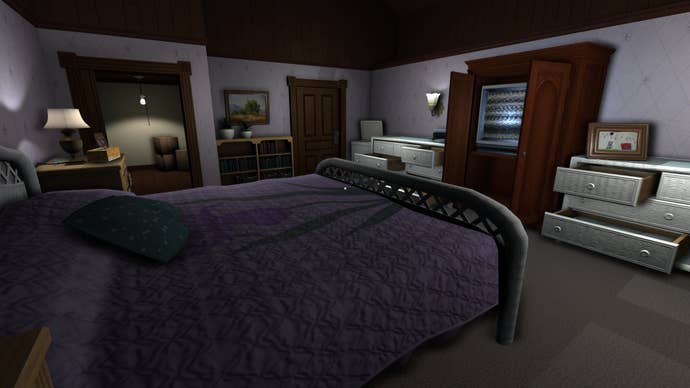
Steve Gaynor – Fullbright
Steve Gaynor, lead designer on one of 2013's biggest indie hits, Gone Home, takes the opposite approach. When I mentioned that Mike Bithell was careful to make sure he had enough cash to have a fallback, Steve abruptly said, "See I don't agree with that. I don't like Plan Bs. When I was in college I thought I'd start towards an English degree and get my teaching certificate. And then I can keep working on my art, and if that fails, I can always go back and be a teacher."
He paused for a minute. "But then I thought,'Man f**k that!' If you have a Plan B, you might use it. So unless you actually want to do your plan B, just remove the net. Because I'll go with the knowledge that if I can't make that work then I don't have anything else, so I have to make it work. Why not make sure it has to be good and remove the ‘or else?'"
Steve was easily the most optimistic developer I spoke with. His company, Fullbright, revealed their next game, Tacoma, at The Game Awards late last year. He was confident that they'd succeed because "we've done this all before." Gone Home was self-funded in much the same. The team, realizing that they wanted to strike out on their own, pooled together their money and figured that they'd have a year and a half to make the best game they could.
"That was it," he said. We knew it would be either break even, it'd bottom out, or we'd make it all back. I think that's a really important motivator. There was no,' Can we can an extension for six months?' No. Where is that money coming from? No, we can't get another six months. We have to make the game."
Most of the Fullbright team also worked together at 2K Marin on the BioShock 2 expansion "Minerva's Den." He said that great experience because while the expansion was important to 2K as a whole, if they needed extra time, they weren't important enough to get an extension. "If we didn't deliver, they would have told us to f**k off. We're putting all of our available budget into our next game… so if we released and nobody bought or failed to launch then yeah, that'd be a problem [laughs]. If it doesn't work out... we'll go back to AAA, but until then this is what we're doing."
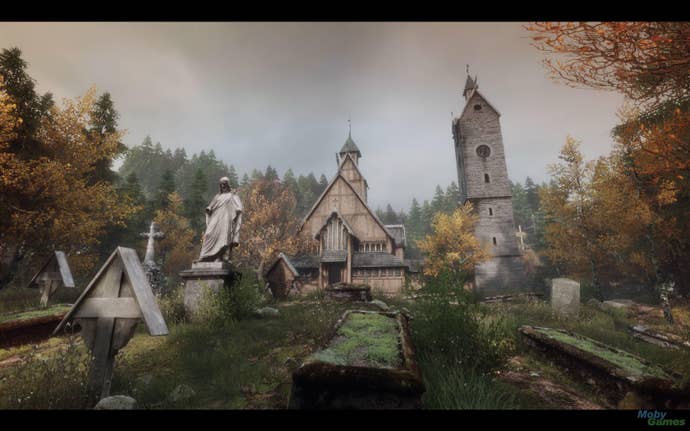
Adrian Chmielarz – The Astronauts
Adrian Chmielarz's The Vanishing of Ethan Carter has a lot in common with Fullbright's Gone Home. Both were narrative-heavy games, sometimes derisively labeled "walking simulators." Some gamers dismissed them because there wasn't much to do, or because they thought the games were too short. Adrian's company The Astronauts, like the folks at Fullbright, were a group of seasoned developers even before they started work on independent games. And while he's loved the experience, Adrian says he's also learned quite a bit more than he expected in the few months following release.
"I had no idea that gamers were so insatiable. The average completion time for Ethan Carter is four and a half hours. But we never hear the end of ‘it's too short.' It's illogical. If you multiplied the price by three, to get a standard retail price, you'd get 13.5 hours – which is decent by any standard. It doesn't matter that most people don't finish games because they're too long. Gamers want husbands and wives, not flings. When they buy a game, they want to be with it, have it around, cherish it. It just needs to be something gamers can invest themselves into with all their heart."
Ethan Carter was about as revered among many critics as Gone Home— picking up excellent review scores all over. It's story was a gripping mystery about the disappearance of a supernaturally gifted child. You, a paranormal investigator, have been sent to explore a decaying village in the Northeastern United States, only to find a string of strange murders and disturbing monsters.
Even so, Adrian was a bit disappointed by the reception. Few critics analyzed the game to the degree that he had hoped, with most saying that the ending was cliché, or relating some of the character to their own lives.
"No one dug even deeper. I don't want to spoil too much, but no one noticed that the game is a metaphor for the five stages of grief, with each murder representing a stage… It's a sad realization of the place games are in right now. I am inclined to believe that no one dug deeper because most people do not expect a video game to have many layers of allegory. We take what's on the surface; maybe look one floor down, and most of the time that's it."
So much of modern game development has tried to push games towards a more literary, adult-focused medium. As the average age of gamers creeps higher and higher, companies have done their best to change up the subject matter and the depth of games. But for Adrian it's not yet enough.
"This situation is totally understandable, and I blame no one. Video games will be the dominant form of entertainment, but still have a long way to go before they are able to compete consistently with movies or books on the level of interpretation and reflection. The most surprising thing was how hard it is to design a narrative game that makes story and gameplay indistinguishable. It took me over a year to get to the point where I was content. And the ingratitude of this work is that in the end the game looks as if it was easy to make."
Adrian and his team have a few other parallels to Fullbright. Both companies emptied their bank accounts to fund their games, and both would not have continued without a hit. Failure, for them, was not an option. But the stress of balancing financial viability and artistic vision is a heavy one to bear. "We wanted to show the world we had something valuable to offer, something we could only do when in full creative control." Adrian didn't want to take an easy path, he didn't want to make a shooter, or something that could be spat out by any other studio.
Ethan Carter was ultimately a success. While not quite as popular as Thomas Was Alone or Gone Home it still accomplished more or less what the team at Astronauts wanted it to. But what if it had failed? When I him, Adrian bluntly says, "I cannot and do not imagine my life outside of games."
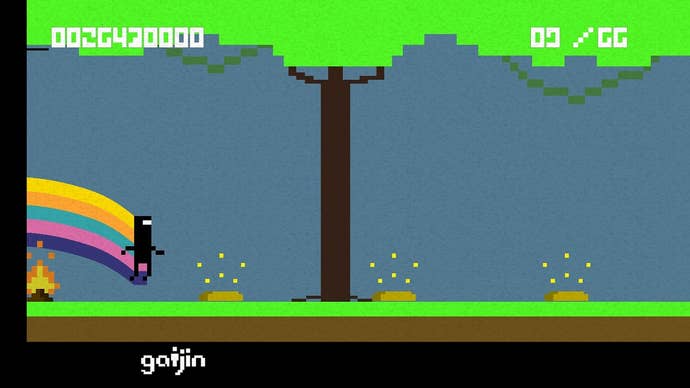
Mike Roush – Choice Provisions
"Mobile gaming has ruined everything," Mike Roush tells me, "and I like mobile games." He'd just come back from paternity leave, and I could hear the exhaustion in his voice. Mike is one of the cofounders of Gaijin Games of Bit.Trip fame, recently rebranded as Choice Provisions.
"The other night I invited some friends over to play some things on my Amazon Fire, and these are non-gaming people. They we stunned that it was free. How can we compete with that? I keep thinking we need to jump on that bandwagon." Mobile games, he says, are contributing to the mental devaluation of games. Why buy something that costs $5 or even $1 when you can get it for free? If there's anything that we can take away from last year's Threes fiasco is that the majority of players don't really care where their games come from. They want something cool and they want it cheap.
And can we blame them? This is basic supply and demand. Independent development is easier. People who may have heard about the success of Braid or Super Meat Boy or any other popular cheap-ish game wants a piece of that seemingly very large pie. Mike notes that it was far easier when he founded the company. "When we first started, we were just three people. We didn't have to do anything, really. People were so hungry for fresh ideas they'd buy anything. Now? Indie games are a dime a dozen."
Exacerbated, no doubt, by Steam's prolific sales. Hundreds of critically acclaimed games all for a few bucks a piece? "Sounds great. Sign us up," we'll say. Every sale, Gabe Newell and Valve are lauded as heroes of the consumer, of the common man because they bring seemingly endless streams of great, cheap games. But that comes at a cost. Instead of paying up front for a game, many specifically wait for the sales. Suddenly a $60 is now worth $30, then $15 and eventually $5.
The flip side of this, is that it can increase the potential audience for games. "There's only so many people willing to buy Runner 2 for $15. Once we've hit all those folks we can knock the price down and down again and again. After a while we get to the point where we realize people just want a game for the Steam trading cards and we'll give it to them for $1." But he worries that this business model isn't sustainable. "I don't know how long things will stay like this, y'know? Everything's changing. We might hit a point where no one wants to buy our game at $15 on Day One."
A few years ago, he was more cavalier. Looking back, it wasn't really possible for the team to mess up too bad. They came in with nothing, and if they left with nothing, "Well at least we'd have a cool game out of it." Now he's struggling to manage a growing company of 20 people with an office in the heart of San Francisco. He won't discuss exact numbers, but just to keep the doors open is "well into" six digits every single month. These kinds of expenses can creep up on you he says. "Certification, paying benefits, paying rent for the office – these things add up really fast."
Their most recent game, Whoa Dave! was profitable, but it's getting tougher to hit those critical numbers.
"To adapt, we've divided up a lot of things. We're like an onion now – we can peel off a lot of layers before we'd have to shutter for good…. But this is still a very different world than we started. We have employees that have lives and families. People rely on us. People need us. I have kids now... We can't fail."
Despite all of these precautions, Mike's afraid of the future. Looking at how hard it is to get noticed on Steam, or how fickle the market seems to be, he leaves me with the following: "The state of gaming is so grim. I think the writing is on the wall for a lot of us, we just can't see it yet."
